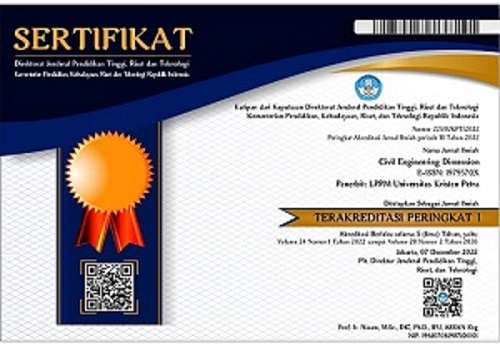APPLICATION OF PACKING THEORY ON GRADING DESIGN FOR POROUS ASPHALT MIXTURES
 :
:
https://doi.org/10.9744/ced.6.2.pp.%2057-63
Keywords:
Grading design, porous asphalt, porosity, permeability, stability.Abstract
The design life of porous asphalt is shorter than dense mix as a consequence of permeability loss due to clogging and poor resistance to disintegration. To mitigate problems associated with clogging, double layer porous asphalt has been constructed in the Netherlands. This paper investigated a development of a new grading design for porous asphalt by varying percentage of aggregate with maximum sizes of 20, 14 and 10mm; a theory of packing was used. The most common method used for grading design is based on empirical, which does not relate the packing behaviour of the aggregate mass. The packing theory used in this study was facilitated by a vibratory compactor. It was found that mixtures containing aggregate sizes 14 and 10mm have a good permeability and stability, when vibrated for 65 second with a frequency of 40Hz, while for aggregates containing 20mm, to achieve the requirement for Marshall stability, the gradation needs to be modified. Properties of porous asphalt based on packing theory are better from the empirical grading from Spain (P-12).Downloads
Published
2004-09-15
How to Cite
Hardiman, H. (2004). APPLICATION OF PACKING THEORY ON GRADING DESIGN FOR POROUS ASPHALT MIXTURES. Civil Engineering Dimension, 6(2), pp. 57-63. https://doi.org/10.9744/ced.6.2.pp. 57-63
Issue
Section
Articles
License
Authors who publish with this journal agree to the following terms:- Authors retain the copyright and publishing right, and grant the journal right of first publication with the work simultaneously licensed under a Creative Commons Attribution License that allows others to share the work with an acknowledgement of the work's authorship and initial publication in this journal.
- Authors are able to enter into separate, additional contractual arrangements for the non-exclusive distribution of the journal's published version of the work (e.g., post it to an institutional repository or publish it in a book), with an acknowledgement of its initial publication in this journal.
- Authors are permitted and encouraged to post their work online (e.g., in institutional repositories or on their website) followingthe publication of the article, as it can lead to productive exchanges, as well as earlier and greater citation of published work (See The Effect of Open Access).
















